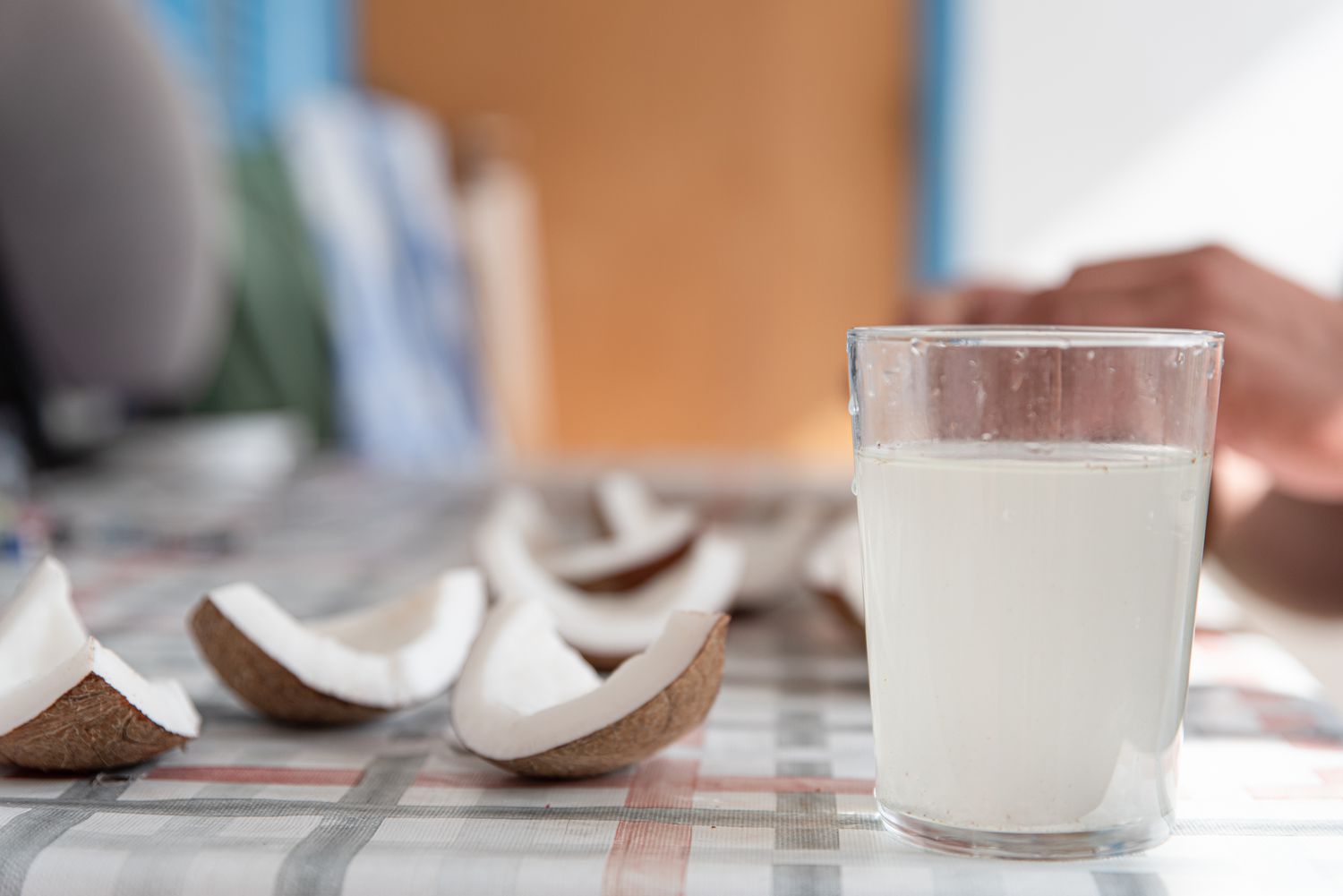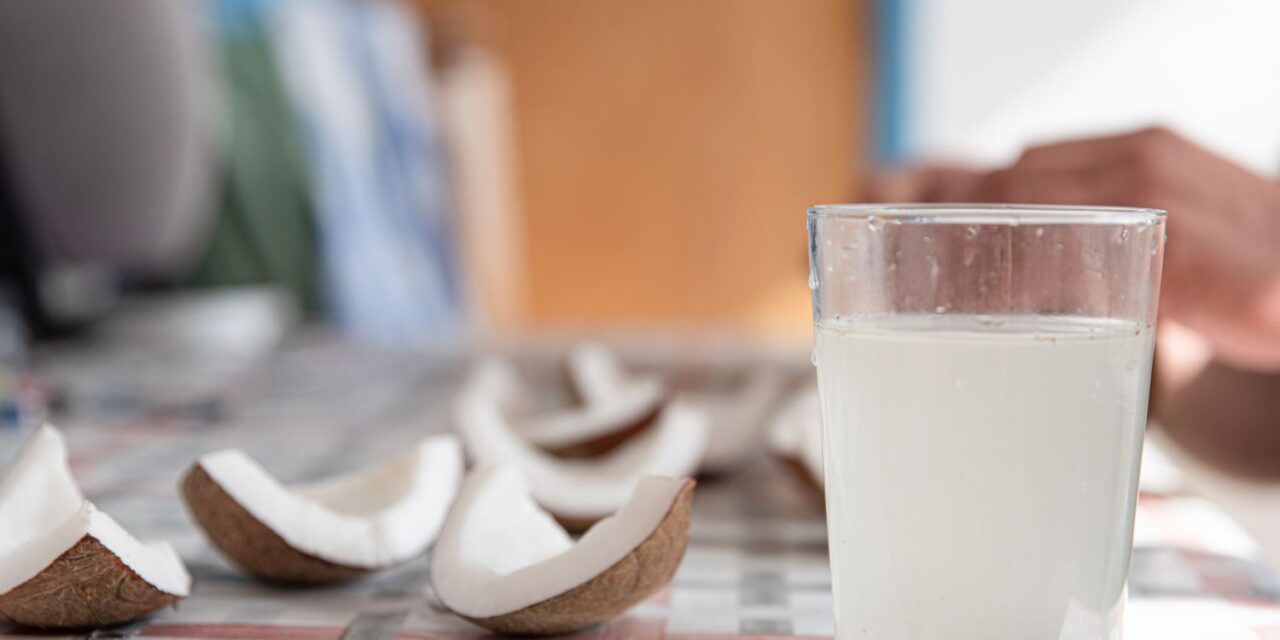
Coconut water is the sweet, nutty, and refreshing liquid in young coconuts. It’s packed with essential vitamins and minerals that help support muscle and nerve function and balance body fluids.
Coconut water is perfect for replenishing fluids after a bout of diarrhea or vomiting, thanks to its high electrolyte content. It’s also a great beverage to rehydrate and nourish muscles after exercise.
This article discusses the many benefits of coconut water, when to drink it, and how to source the best coconut water on the market.
DERO2084 / Getty Images
Coconut Water vs. Coconut Milk
Coconut water is the clear juice found in young, green coconuts. Coconut milk comes from the brown mature coconuts, where the meat and juice are blended to make a creamy drink.
The Top Benefit of Coconut Water: Electrolytes
Coconut water contains many natural electrolytes, such as sodium, magnesium, calcium, and potassium. Electrolytes are minerals essential for balancing the amount of water in your body, moving waste into and out of cells, supporting muscle and nerve function, and stabilizing blood pressure.
Sometimes, working out or losing a lot of liquid can cause an electrolyte imbalance, which is why sports drinks, which have electrolytes, are so popular. An imbalance of electrolytes can occur when the amount of water in your body changes drastically, like after vomiting or having diarrhea.
Coconut water is lower in sugar than most sports drinks and has carbohydrates, which may help improve muscle function. Research found coconut water more beneficial than regular water for rehydration after exercise because of its high electrolyte count.
Although coconut water contains natural electrolytes, it is not the best option after a long, high-intensity workout. Coconut water has less sodium than other sports drinks.
5 Other Impressive Benefits
In addition to electrolytes, coconut water has many other health benefits, including:
- Lowers blood pressure: One cup of coconut water has 400 milligrams (mg) of potassium. A potassium-rich diet has been shown to reduce blood pressure and support heart health.
- Protects against free radicals: The antioxidants in coconut water have been shown to help fight cellular damage in the body.
- Prevents kidney stones: Water from coconuts may help prevent kidney stones by flushing the system of excess crystal-forming minerals.
- Stronger bones and teeth: The combination of phosphate and calcium in coconut water works together to help build strong bones and teeth.
- Stabilizes blood sugar: Magnesium in coconut water can help control blood glucose (sugar).
Nutrition Breakdown of Coconut Water
Coconut water has been touted as nature’s sports drink because of its high levels of vitamin C and potassium. It’s also low in calories and fat. One cup of 100% coconut water has:
- Calories: 44
- Fat: 0 grams (g)
- Sodium: 64 milligrams (mg)
- Carbohydrates: 10.4 g
- Fiber: 0 g
- Sugars: 9.6 g
- Protein: 0.5 g
- Vitamin C: 24.3 mg
- Potassium: 404 mg
When Coconut Water Could Come in Handy
Since coconut water is so hydrating and remineralizing, consider reaching for it in these scenarios:
- After exercise
- On hot days
- After being in a sauna or steam room
- During bowel prep for a colonoscopy
- If you have chronic diarrhea
- After a stomach virus
- To replenish fluids if medically dehydrated
Health-Wise, Is It OK to Drink Every Day?
Whether drinking coconut water is healthy to drink daily depends on your health and lifestyle. Consider your level of activity, the climate you live in, and your fluid intake from other sources. It all depends on your health and lifestyle.
Consider your level of activity, climate, and other fluid intake. Magnesium and potassium deficiencies are widespread in the United States—coconut water can supply these nutrients in high amounts.
Studies also show that women who increase magnesium intake during the luteal phase of their period (the two weeks leading to menstruation) saw a decrease in symptoms.
Should Anyone Not Drink Coconut Water?
See a healthcare provider before drinking coconut water if you have renal (kidney) failure, chronic kidney disease, or take medications such as angiotensin converting enzyme (ACE) inhibitors. It’s high in potassium, and when the kidneys can’t properly remove excess minerals from the body, a life-threatening condition called hyperkalemia (too much potassium in the blood) can occur.
If you have irritable bowel syndrome (IBS) or are following a low-FODMAP (fermentable oligo-, di-, and monosaccharides, and polyols) diet, limit or avoid coconut water because it contains certain carbohydrates that can exasperate digestive symptoms.
Coconuts are not tree nuts, so people with tree nut allergies can still safely consume coconut, but there are rare cases of coconut allergies.
Choosing Quality Store-Bought Coconut Water
Why is some coconut water refrigerated and some not? Why are some brands pink and others clear? Choosing quality store-bought coconut water can be confusing. Here’s what you need to know:
- Always look for 100% coconut water (not made from concentrate). Avoid products labeled as “coconut juice,” as this is often coconut water mixed with other ingredients, like fruit juice or flavorings. To be sure, scan the ingredients label and make sure there is no added sugar or other ingredients.
- Pink coconut water is due to the natural oxidation of its sugars. The color also indicates it has not been pasteurized in high temperatures, which can reduce natural vitamins and minerals. Refrigerated coconut water is richer in flavor and a bit pricier.
- Coconut water that is not refrigerated in the store is considered shelf-stable. This means it’s been pasteurized (heated to high temperatures) to maintain freshness. It’s also more affordable than refrigerated coconut water.
Young Coconut Water
Most coconut water comes from young, green coconuts, about 7 or 8 months of age. The more mature brown coconuts are better used for coconut milk, where the liquid and “meat” of the coconut are blended to make a creamy substance.
Summary
Coconut water is a naturally sweet drink that has several health benefits, thanks to all of its vitamins and electrolytes. From supporting heart health to stabilizing blood sugar and other benefits, it’s healthy to drink daily, especially if you exercise often or have chronic diarrhea. Anyone with kidney issues or IBS should consult a healthcare professional before making it a regular beverage.





